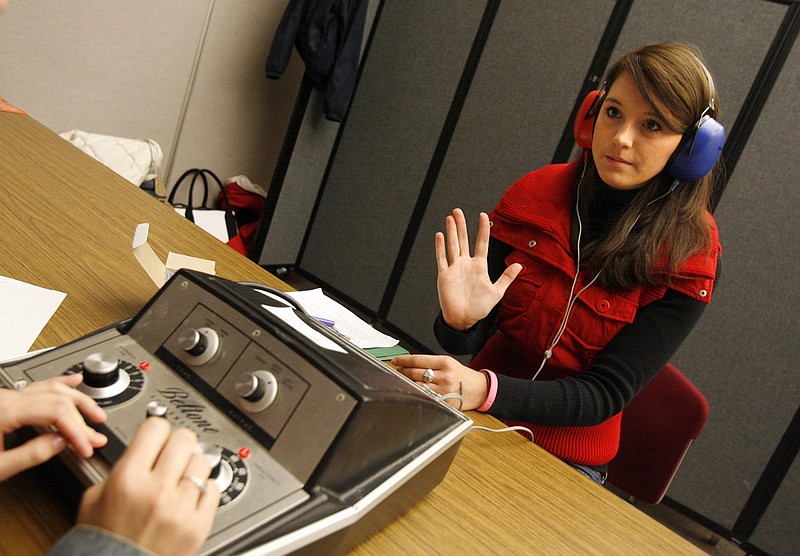Speech-language pathologists who work in schools in Arkansas are overworked, underpaid and often find themselves mired in paperwork, a group of therapists told members of the state legislature last week.
Despite Arkansas having the second-highest number of speech-language pathologists per capita in the nation, increasingly fewer want to work in schools, the group said.
The General Assembly commissioned the Arkansas Speech-Language Hearing Association to study recruiting and retaining speech-language pathologists in public schools. The interim study, presented last week to a joint Senate and House committee on education, said it is getting harder for school districts to recruit and retain speech-language pathologists.
Recruitment and retention of school speech-language pathologists comes down to relatively low salaries, increased demand and mounting paperwork.
School speech-language pathologists have a wide range of duties that can stretch from helping English as second language students or those with autism. The therapists help students with pronunciation, oral motor skills, hearing, social skills and cognition.
The state has no shortage of speech-language pathologists, but many graduates opt for jobs in the private sector where pay is higher and paperwork is more streamlined.
In Arkansas, the average annual salary for a speech-language pathologist is $77,240, according to the Bureau of Labor Statistics, but can be much lower for those working in schools, said Michelle Donnell, a lead speech-language pathologist for the Springdale School District.
Donnell said in schools salaries typically range from $36,000 to $53,000 a year. In Missouri, the average annual salary for a school speech-language pathologist is $59,000, and in Texas it is $63,000, Donnell said.
Pay for speech-language pathologists can be higher in the private sector where the average salary is $78,000 per year, according to a 2020 study from the American Speech-Language-Hearing Association.
A shortage of professionals is not the state's problem. Arkansas is second in the nation in certified speech-language pathologists, according to the American Speech-Language-Hearing Association.
"That's not completely shocking as we do have five highly reputable graduate programs that are producing clinicians each year," said Lauren Rogers, a lead speech-language pathologist for Conway Public Schools. "But what is concerning and what we are not able to explain is why a state with a high ratio of [speech language pathologists] is struggling to fill those vacancies across our [Local Education Agencies] across the state."
For graduates of speech-language pathologist master's programs in Arkansas, careers in schools are not as attractive as a job in the private sector where pay is higher, caseloads are manageable and paperwork is streamlined.
In schools, speech-language pathologists often find themselves spending hours each day on state, local and federally mandated paperwork that may be required for each student they see.
"In terms of salaries, schools are in that bottom tier," said Dana Moser, director of the master's program in speech-language pathology at the University of Arkansas for Medical Sciences in an interview. "So a graduating student can start earning more money off the bat in a hospital-based settings."
In 2021, 30% of those who graduated from UAMS with a master's degree in speech-language pathology went to work in schools. In 2022 it was 10% of graduates, which Moser said was an anomaly and not yet an indication of a trend.
Nationally, 51% of speech-language pathologists work in schools, according to a 2020 study from the American Speech-Language-Hearing Association.
"So a lot of students we get want to be working in the schools and they are passionate about kids -- school-age children -- but the schools, if I could give advice to them, is to just make their positions more competitive in terms of salaries or stipends and work expectations," Moser said.
It's not just salaries hurting recruiting and retention, but caseloads in schools have also increased because of schools shutting down during the covid-19 pandemic. During virtual learning, many students couldn't get access to the speech therapy they would normally get while at school and others went undiagnosed while sitting at home instead of in a classroom.
Arkansas regulations said that school speech-language pathologists' caseloads cannot exceed 45 students, but in recent years therapists are having to take on more, Rogers said. That means larger group therapy and less one-on-one time.
"In Arkansas over the past two years, our speech-language pathologists have noted that they have seen an increase not only in caseload size but again in our workload demands," Rogers said.
The increase in caseloads comes as paperwork for therapists is on the rise as a combination of state, federal and local laws require detailed documentation of each case and session.
"Paperwork is a part of every job, but it seems like it is becoming a little bit more detailed as our profession increases," Rogers said.
State Sen. Joyce Elliott, D-Little Rock, said the state has an opportunity to fix the issues of retaining and recruiting speech-language pathologists in the next session, saying funds for increased salary or stipends could help stymie the problem.
"I think it's an opportunity to be preemptive to a crisis that is obviously going to face us if we don't take a look at what's happening right now and look at the compensation," Elliott said in an interview. "That we are not competitive and the workload that is almost at a point where professionals can't do a job."
